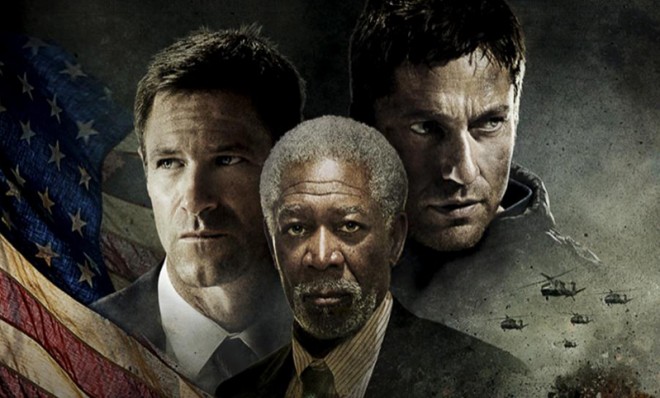Olympus falls over a fact


After giving the Secret Service a hard time last week, here's something remarkable to think about. Not once, in the history of the Service, has a member of a protective detail ever betrayed his mission or her conscience. Not once. Ever. There are no Aldrich Ameses, Robert Hanssens, no Ronald Peltons or Earl Pitts. More than 110 years of treason-free protection.
So why does almost every movie about the Secret Service rely on such a betrayal to advance the plot?
Olympus Has Fallen, written and directed by Antoine Fuqua, is an entertaining thriller. I enjoyed it. It won't spoil the plot to say that one key Secret Service agent switches sides at some point, which gives the bad guy access to White House security secrets. The writer made this choice because the bad guys somehow had to find a way to penetrate the security perimeter. Yes, a Secret Service agent is the hero of the movie, too. But the reason the agent who betrays country situates himself thusly is very conventional: something about big banks and campaign contributions and corruption.
The Week
Escape your echo chamber. Get the facts behind the news, plus analysis from multiple perspectives.

Sign up for The Week's Free Newsletters
From our morning news briefing to a weekly Good News Newsletter, get the best of The Week delivered directly to your inbox.
From our morning news briefing to a weekly Good News Newsletter, get the best of The Week delivered directly to your inbox.
Olympus is not a character study, and it's hard to do a movie that pulls together the elements needed to get butts in the seats as well as the time and dialogue needed to put the viewer inside the mind of a Secret Service agent on the Presidential Protective Detail. In the Line of Fire (1993) came close, but most PPD agents I've encountered aren't haunted by the Kennedy assassination.
To me, the most remarkable thing about the Ahmadinejad incident is the fact that the Service guards the President of Iran in the first place. Agents assigned to the detail will take a bullet as readily for him as they would for the Prime Minister of Israel or even the President of the United States. Get inside the head of THOSE agents, and make a movie about THAT!
A free daily email with the biggest news stories of the day – and the best features from TheWeek.com
Marc Ambinder is TheWeek.com's editor-at-large. He is the author, with D.B. Grady, of The Command and Deep State: Inside the Government Secrecy Industry. Marc is also a contributing editor for The Atlantic and GQ. Formerly, he served as White House correspondent for National Journal, chief political consultant for CBS News, and politics editor at The Atlantic. Marc is a 2001 graduate of Harvard. He is married to Michael Park, a corporate strategy consultant, and lives in Los Angeles.
-
 Gavin Newsom and Dr. Oz feud over fraud allegations
Gavin Newsom and Dr. Oz feud over fraud allegationsIn the Spotlight Newsom called Oz’s behavior ‘baseless and racist’
-
 ‘Admin night’: the TikTok trend turning paperwork into a party
‘Admin night’: the TikTok trend turning paperwork into a partyThe Explainer Grab your friends and make a night of tackling the most boring tasks
-
 Find art, beautiful parks and bright pink soup in Vilnius
Find art, beautiful parks and bright pink soup in VilniusThe Week Recommends The city offers the best of a European capital
-
 Walter Isaacson's 'Elon Musk' can 'scarcely contain its subject'
Walter Isaacson's 'Elon Musk' can 'scarcely contain its subject'The latest biography on the elusive tech mogul is causing a stir among critics
-
 Welcome to the new TheWeek.com!
Welcome to the new TheWeek.com!The Explainer Please allow us to reintroduce ourselves
-
 The Oscars finale was a heartless disaster
The Oscars finale was a heartless disasterThe Explainer A calculated attempt at emotional manipulation goes very wrong
-
 Most awkward awards show ever?
Most awkward awards show ever?The Explainer The best, worst, and most shocking moments from a chaotic Golden Globes
-
 The possible silver lining to the Warner Bros. deal
The possible silver lining to the Warner Bros. dealThe Explainer Could what's terrible for theaters be good for creators?
-
 Jeffrey Wright is the new 'narrator voice'
Jeffrey Wright is the new 'narrator voice'The Explainer Move over, Sam Elliott and Morgan Freeman
-
 This week's literary events are the biggest award shows of 2020
This week's literary events are the biggest award shows of 2020feature So long, Oscar. Hello, Booker.
-
 What She Dies Tomorrow can teach us about our unshakable obsession with mortality
What She Dies Tomorrow can teach us about our unshakable obsession with mortalityThe Explainer This film isn't about the pandemic. But it can help viewers confront their fears about death.
